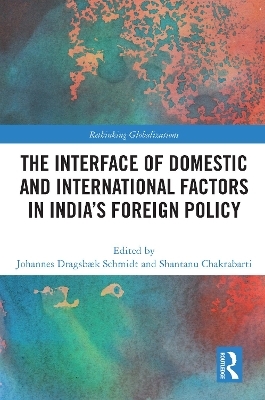
The Interface of Domestic and International Factors in India’s Foreign Policy
Routledge (Verlag)
978-0-367-64135-1 (ISBN)
This book investigates the interplay of internal and external constraints, challenges and possibilities regarding foreign policy in India.
It is the first attempt to systematically analyse and focus on the different actors and institutions in the domestic and international contexts who impose and push for various directions in India’s foreign policy. Rather than focusing on any one particular theme, the book explores the myriad aspects of foreign policymaking and the close interface between the domestic and external aspects in Indian policymaking. In turn, this relates to the structural issues shaping and reshaping the Asian regional dynamics and India’s connectivity within a globalized world.
This book will be of great interest to postgraduate students; scholars of Asian Studies, development, and political science and international relations; and all those involved in policy – especially foreign policy – within India and South Asia. It will also be useful for people working in professional branches of consultancy and the private sector dealing with India and with South Asia in general.
Johannes Dragsbæk Schmidt is an Adjunct Associate Professor in Development and International Relations at Aalborg University, Denmark. He is also a Senior Expert at the Nordic Institute for Asian Studies (NIAS) at Copenhagen University, Denmark, and Senior Research Associate at the Global Policy Institute (GPI) in London, UK. Shantanu Chakrabarti is Professor in the Department of History and Convenor of the Academic Committee at the Institute of Foreign Policy Studies at the University of Calcutta, India.
1. The Interface of Domestic and International Factors in India’s Foreign Policy: Introducing the Issues Part I: The Evolution of Reactive and Proactive Foreign Policy 2. The Struggle Between Political Idealism and Policy Realism: The Making of India’s Nuclear Policy 3. India’s Foreign Policy and Domestic Compulsions: Theorizing the Margins of Exclusion 4. India’s Foreign Aid Policy: Aid Recipient and Aid Donor Part II: Global Ambitions, Internal and Regional Constraints 5. Status of Malaysian-Indians in Malaysian Social Matrix: Reconciling the Juxtaposition of Foreign Policy and Coalition Politics in India 6. Towards an Eastern South Asian Community: Regional and Sub-Regional Cooperation as a Viable Foreign Policy Initiative 7. The Elephant and the Panda – India and China: Global Allies and Regional Competitors Part III: Identity, Migration and Structural Dimensions 8. Party Politics and its Influence over Foreign Policymaking in India 9. Differentiated Citizenship: Multiculturalism, Secularism and Indian Foreign Policy 10. From Periphery to the Centre: Subnationalism and Federal Foreign Policies within a State Nation Part IV: Looking In – Outside Out: Northeast of India Related to India's Foreign Policymaking 11. Manipur Dynamics in India’s Myanmar Policy: Politico-Economic Perspective 12. Thinking, Looking and Acting: Beyond East and Southeast to the ‘Other Asia’ 13. Federalization of Indian Foreign Policy: Recent Trends
| Erscheinungsdatum | 07.09.2022 |
|---|---|
| Reihe/Serie | Rethinking Globalizations |
| Zusatzinfo | 11 Tables, black and white; 2 Line drawings, black and white; 2 Illustrations, black and white |
| Verlagsort | London |
| Sprache | englisch |
| Maße | 156 x 234 mm |
| Gewicht | 453 g |
| Themenwelt | Sozialwissenschaften ► Politik / Verwaltung ► Europäische / Internationale Politik |
| Sozialwissenschaften ► Politik / Verwaltung ► Staat / Verwaltung | |
| Sozialwissenschaften ► Soziologie ► Spezielle Soziologien | |
| ISBN-10 | 0-367-64135-6 / 0367641356 |
| ISBN-13 | 978-0-367-64135-1 / 9780367641351 |
| Zustand | Neuware |
| Informationen gemäß Produktsicherheitsverordnung (GPSR) | |
| Haben Sie eine Frage zum Produkt? |
aus dem Bereich


